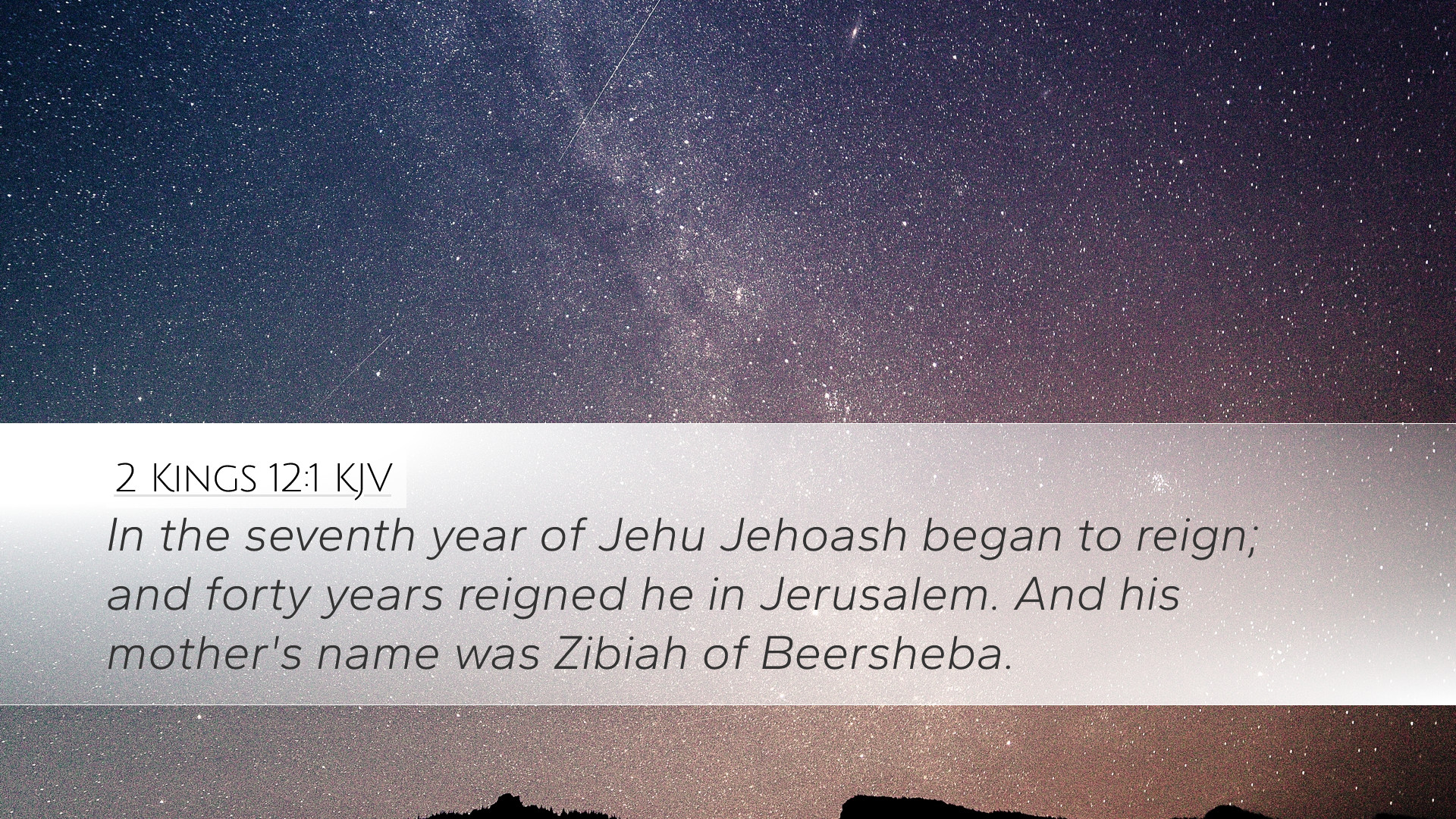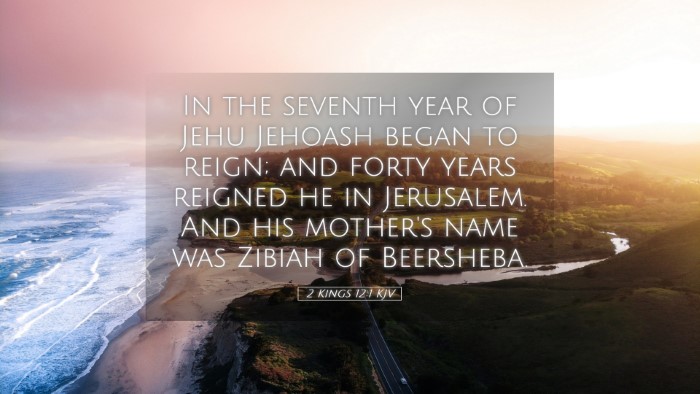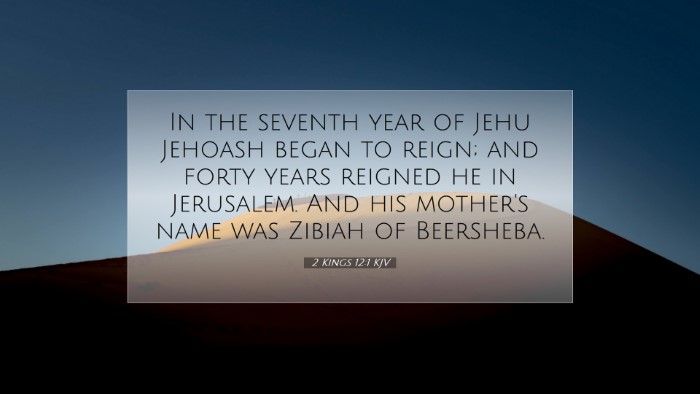Old Testament
Genesis Exodus Leviticus Numbers Deuteronomy Joshua Judges Ruth 1 Samuel 2 Samuel 1 Kings 2 Kings 1 Chronicles 2 Chronicles Ezra Nehemiah Esther Job Psalms Proverbs Ecclesiastes Song of Solomon Isaiah Jeremiah Lamentations Ezekiel Daniel Hosea Joel Amos Obadiah Jonah Micah Nahum Habakkuk Zephaniah Haggai Zechariah Malachi2 Kings 12:1
2 Kings 12:1 KJV
In the seventh year of Jehu Jehoash began to reign; and forty years reigned he in Jerusalem. And his mother's name was Zibiah of Beersheba.
2 Kings 12:1 Bible Commentary
Commentary on 2 Kings 12:1
Verse: "In the seventh year of Jehu, Jehoash began to reign; and he reigned forty years in Jerusalem. And his mother's name was Zibiah of Beersheba." (2 Kings 12:1)
Introduction
The reign of Jehoash, also known as Joash, marks a significant era in the history of Judah. This verse introduces a king who ascends the throne at a young age, under unique circumstances of leadership transition. The commentaries provide profound insights into the implications of his reign, the context of his childhood, and the socio-political environment of Judah during his rule.
Historical Context
Jehoash ascended to the throne at a time when the nation was recovering from the reign of Athaliah, a queen who had usurped power following the death of her son, Ahaziah. According to Matthew Henry, the aftermath of her rule was characterized by instability and idolatry, which Jehoash would later address.
Political Environment
The commentaries of Albert Barnes and Adam Clarke highlight the significance of Jehoash's reign in the context of Judah's political alliances and conflicts. His rise occurred during Jehu’s reign in Israel—a time marked by conflict and reform against Baal worship—a critical aspect of the broader narrative of the divided kingdom.
Jehoash’s Age and Background
Jehoash was only seven years old when he began to reign, as noted by the ancient historians. Albert Barnes points out that this age reflects the tragic circumstances of his early life, having been hidden from Athaliah's decree to purge the royal line. Raised in the temple by Jehoiada the priest, Jehoash was influenced heavily by the priestly guidance, as reflected in the reforms he later implemented.
The Influence of Jehoiada
Jehoiada served not only as a mentor but also as a stabilizing force during the young king's reign. Matthew Henry emphasizes the importance of divine providence in preserving Jehoash and guiding him towards righteousness, contrasting the chaos of his grandmother's rule with the potential for godly kingship highlighted by his upbringing.
Character and Achievements
Jehoash’s reign lasted for forty years, a somewhat uncommon duration for kings of Judah. Adam Clarke notes that his long reign permits extensive reforms and rebuilding efforts in Jerusalem, particularly the restoration of the temple, which stood as a symbol of faith and national identity for the Israelites.
Religious Reforms
Upon ascending to the throne, Jehoash initiated a series of religious reforms aimed at restoring true worship of Yahweh. Barnes observes that his early years, influenced by Jehoiada, were marked by significant action against idolatry and the repair of the temple. His desire to fund the repair was a crucial element of his kingship, demonstrating the restoration of proper worship as a priority. This can be seen as an effort to bring the nation back to foundational spiritual practices.
Lessons for Contemporary Readers
Jehoash's reign offers several lessons pertinent for modern readers, especially for pastors and theologians:
- Divine Sovereignty: The rise of Jehoash under divine providence emphasizes the theme of God’s control over earthly rulers.
- Influence of Leadership: The substantial impact of Jehoiada on Jehoash's reign serves as a reminder of the importance of mentorship and spiritual guidance in leadership.
- The Need for Reform: Jehoash's determination to restore the temple underscores the call for continual reform and renewal in the church today.
- God's Faithfulness: Despite the failures of previous generations, the faithfulness of God in preserving a line for His purposes is a profound theological theme.
Conclusion
In summary, 2 Kings 12:1 serves as more than a historical marker; it encapsulates themes of restoration, divine providence, and the importance of righteous leadership. The insights from public domain commentaries enrich our understanding of Jehoash’s significance in the biblical narrative, providing timeless truths applicable to today's church and leadership contexts.


